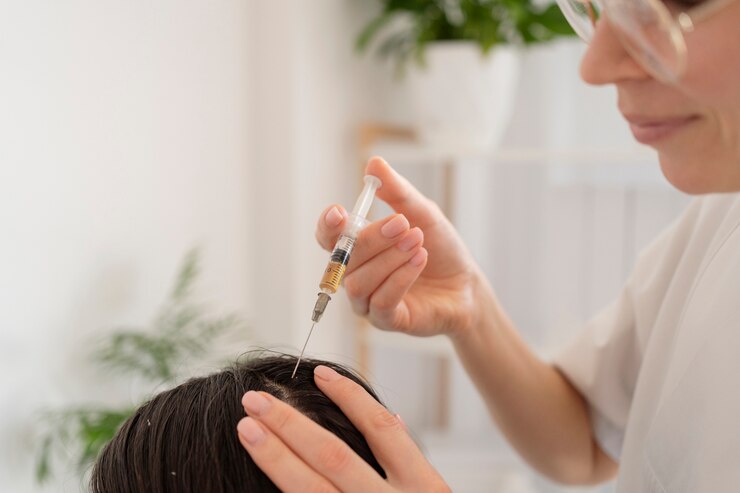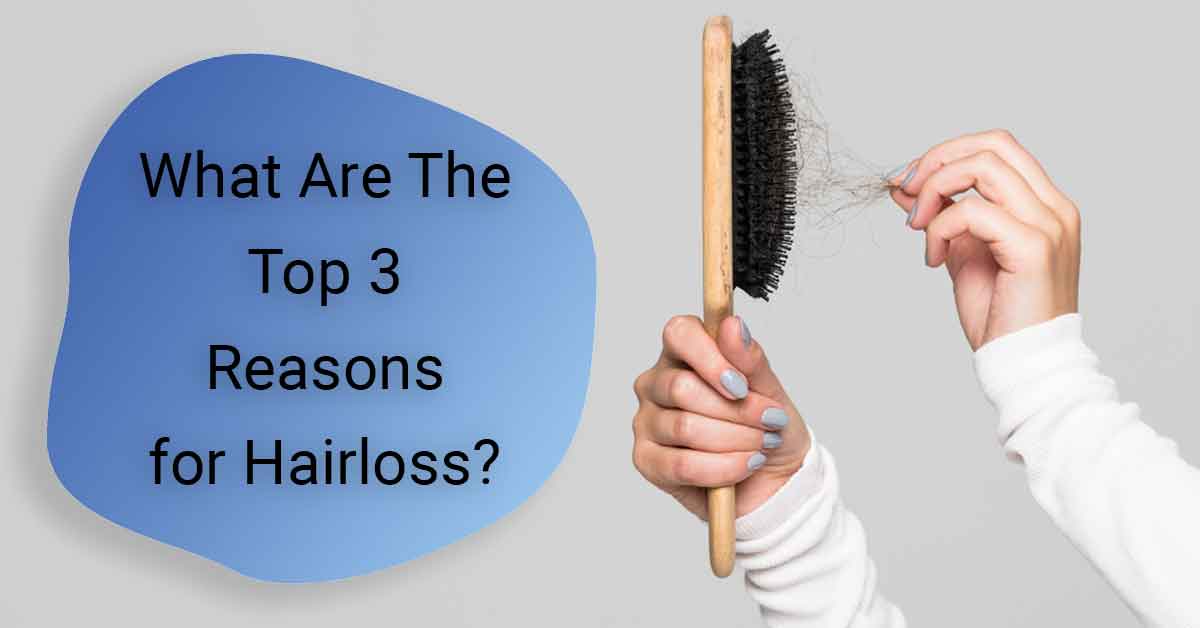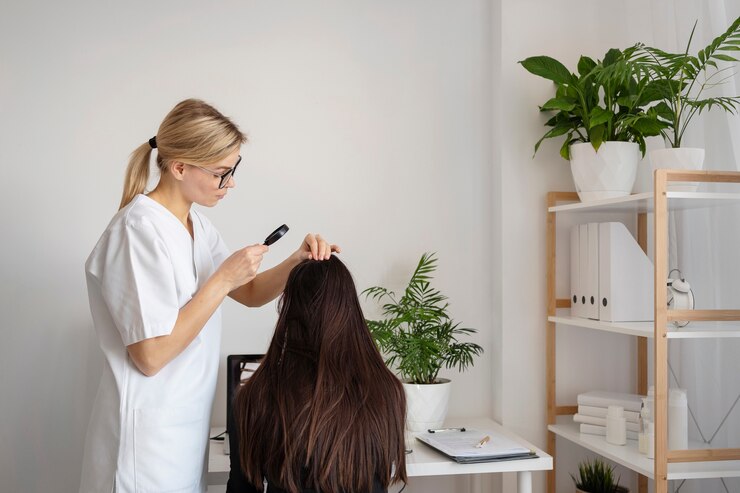The top 3 treatments for hair loss are minoxidil, finasteride, and hair transplant surgery. Minoxidil is an over-the-counter topical solution, whereas finasteride is a prescription oral medication.
Hair transplant surgery involves moving hair follicles from one part of the body to the balding areas. Dealing with hair loss can be a challenging and emotional experience for many individuals. Whether it’s due to genetics, hormonal changes, or other underlying medical conditions, finding effective hair loss treatments is crucial for boosting confidence and self-esteem.
We will explore the top 3 solutions for addressing hair loss, including their effectiveness, potential side effects, and how they work to promote hair regrowth. By understanding the available options, individuals can make informed decisions about the best approach to combatting hair loss and restoring a full, healthy-looking head of hair.

Photo Credit: https://www.freepik.com
Causes Of Hair Loss
When it comes to hair loss, there are various factors that contribute to this condition. Understanding the causes of hair loss is crucial in implementing effective solutions. Genetic factors, hormonal changes, and medical conditions play a significant role in the loss of hair.
Genetic Factors
Genetic factors can significantly contribute to hair loss. Individuals with a family history of baldness or thinning hair are more prone to experiencing hair loss. Typically, this type of hair loss is known as male or female pattern baldness, and it is linked to the genes inherited from one’s parents.
Hormonal Changes
Hormonal changes can also play a role in hair loss. Fluctuations in hormone levels, particularly during puberty, pregnancy, and menopause, can trigger hair loss. The hormone dihydrotestosterone (DHT) is known to shrink hair follicles, leading to thinner and shorter hair growth.
Medical Conditions
Various medical conditions can contribute to hair loss. Conditions such as thyroid disorders, autoimmune diseases, and scalp infections can interfere with the normal hair growth cycle. Additionally, undergoing medical treatments such as chemotherapy can lead to temporary hair loss.
Top 3 Natural Remedies
When it comes to tackling hair loss, natural remedies can be incredibly effective. Top 3 Natural Remedies for hair loss include essential oils, scalp massage, and nutrition and diet. These remedies are not only cost-effective but also lead to healthier and stronger hair, without the need for harsh chemical treatments.
Essential Oils
Essential oils such as peppermint, rosemary, and lavender have been found to promote hair growth and reduce hair loss. These oils work by stimulating the hair follicles and improving circulation to the scalp. When applied topically through a carrier oil, essential oils can nourish the scalp and promote thicker, healthier hair.
Scalp Massage
The simple technique of scalp massage can work wonders in combating hair loss. By gently massaging the scalp, blood flow to the hair follicles is increased, promoting hair growth. This therapy also helps in reducing stress, which is a common underlying cause of hair loss.
Nutrition And Diet
Optimal nutrition and a balanced diet play a crucial role in maintaining healthy hair. Foods rich in biotin, vitamin E, and omega-3 fatty acids can help in preventing hair loss and promoting hair growth. Incorporating foods such as eggs, nuts, seeds, and fish into your diet can provide essential nutrients and contribute to stronger, thicker hair.
Over-the-counter Treatments
Hair loss is a widespread concern affecting both men and women. While there are various treatment options available, Over-the-Counter (OTC) treatments are often the first choice for many individuals due to their convenience and accessibility. In this article, we will delve into the top three Over-the-Counter treatments for hair loss, including Minoxidil, Finasteride, and Laser Therapy.
Minoxidil
Minoxidil, also known as Rogaine, is a popular OTC treatment for hair loss that comes in the form of a topical solution or foam. It is applied directly to the scalp and is believed to stimulate hair growth by dilating blood vessels in the scalp, increasing blood flow, and promoting hair follicle function. While the exact mechanism of action is not fully understood, Minoxidil has been clinically proven to be effective in slowing down hair loss and promoting the regrowth of hair in some individuals.
Finasteride
Finasteride, commonly known as Propecia, is an oral medication that works by inhibiting the activity of the enzyme 5-alpha-reductase, which is responsible for converting testosterone into dihydrotestosterone (DHT). Finasteride helps reduce DHT levels in the scalp, thereby slowing down hair loss and promoting hair regrowth. It is important to note that Finasteride is only approved for use in men and may have potential side effects, so it is essential to consult a healthcare professional before using this medication.
Laser Therapy
Laser Therapy for hair loss involves the use of low-level laser devices or combs that emit red light to the scalp. The light is believed to stimulate hair follicles and promote hair growth. Laser Therapy is a non-invasive and painless treatment option that can be used at home. While the effectiveness of laser therapy for hair loss may vary among individuals, some studies have shown promising results in improving hair density and thickness.
Lifestyle Changes For Hair Health
When it comes to maintaining healthy hair and preventing hair loss, making lifestyle changes can play a significant role. Lifestyle modifications can contribute to improved hair health and reduce the risk of hair loss. Here are the top 3 lifestyle changes that can positively impact the health of your hair:
Stress Management
In today’s fast-paced world, stress can take a toll on overall health, including the condition of your hair. Managing stress through relaxation techniques such as meditation, deep breathing exercises, and yoga can help promote healthier hair growth. Chronic stress can lead to hair loss, so it’s important to prioritize stress reduction for the sake of your hair and overall well-being.
Regular Exercise
Engaging in regular physical activity not only benefits your body but also contributes to healthier hair. Exercise helps improve blood circulation, which in turn delivers essential nutrients to the hair follicles. Incorporating activities such as jogging, swimming, or strength training into your routine can promote better overall hair health.
Proper Hair Care Routine
Adopting a consistent and proper hair care routine is crucial for maintaining healthy hair and preventing hair loss. This routine includes using suitable hair products, limiting the use of heat styling tools, and minimizing exposure to harsh chemicals. Additionally, regular scalp massages and choosing gentle hair accessories can also contribute to healthier hair.
Seeking Professional Help
If you are experiencing hair loss, seeking professional help is the first step towards finding the most effective solution for your specific condition. Consulting a dermatologist, exploring hair transplant options, and considering medication choices are essential aspects of seeking professional help for hair loss. Let’s delve into these top 3 options in detail:
Consulting A Dermatologist
Scheduling a consultation with a board-certified dermatologist is crucial for diagnosing the cause of your hair loss and determining the most suitable treatment plan. A dermatologist can conduct a thorough assessment of your scalp, review your medical history, and recommend personalized solutions to address your hair loss concerns.
Hair Transplant Options
For individuals with advanced hair loss, hair transplant procedures can be an effective long-term solution. Hair transplants involve taking hair follicles from the back or sides of the head and implanting them into the balding areas. This surgical intervention can provide natural-looking results and significantly improve hair density.
Exploring Medication Options
There are various medications available to address different types of hair loss, including minoxidil, finasteride, and other prescription treatments. These medications can help slow down hair thinning, promote hair regrowth, and prevent further hair loss. It’s important to discuss the potential benefits and side effects of these medications with a medical professional before starting any treatment regimen.

Credit: rhrli.com
Frequently Asked Questions Of What Are The Top 3 For Hair Loss?
What Are The Common Causes Of Hair Loss?
Hair loss can be caused by genetics, hormonal changes, stress, and nutrition deficiencies. Other factors such as illness and certain medications can also contribute to hair loss. Consult a dermatologist to determine the exact cause of your hair loss.
How Can I Prevent Hair Loss?
Maintain a well-balanced diet, manage stress, and avoid harsh hair treatments. Using gentle hair care products and minimizing heat styling can also help prevent hair loss. Additionally, consider using hair growth promoting treatments recommended by your dermatologist.
Are There Natural Remedies For Hair Loss?
Natural remedies such as essential oils, scalp massages, and dietary supplements have shown some effectiveness in promoting hair growth. However, it’s important to consult a healthcare professional before trying these remedies to ensure they are safe and suitable for your individual needs.
Conclusion
Addressing hair loss requires a holistic approach that combines proper nutrition, stress management, and targeted treatments. With a focus on nourishing the scalp and optimizing overall health, individuals can take proactive steps to mitigate hair loss and promote regrowth. Remember, consistency and patience are key in combating this common concern.

